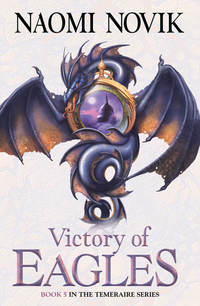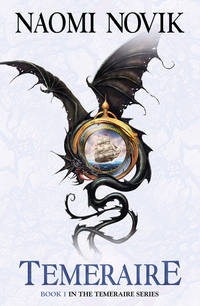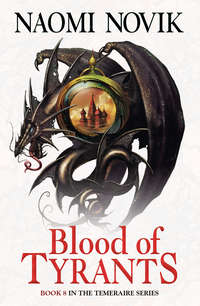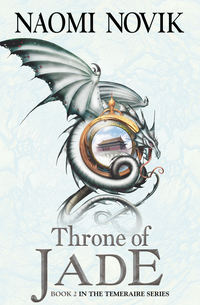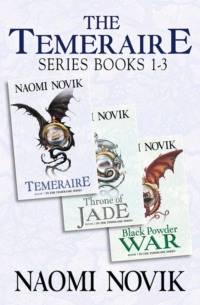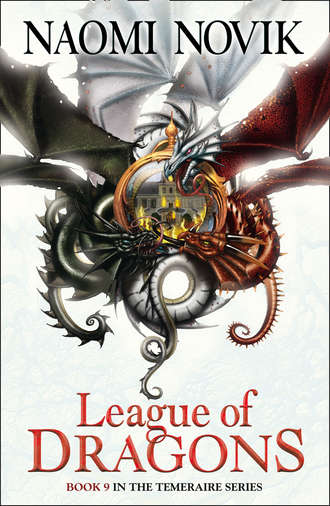
Полная версия
League of Dragons
They flew northward along the line of the river: already a dozen marching ant-lines dotted across the frozen white surface. Behind them, the French company fired up signal-flares in varied colors, surely signaling to their fellows ahead. As the Russian dragons closed in on the next crossing, a volley of musketry fired to greet them, and they had to go higher aloft: painful in the cold weather, and there was not an Incan dragon to be seen; only a few French middle-weights gathered by their guns, who eyed the mass of Russian heavy-weights with some anxiety.
There were, however, a dozen wagons crossing the river under guard by the company, pulled by teams of horses, many of them having lost their hoods: they went frantic and heaving with the dragons overhead. And the wagons were laden not only with wounded but with pillaged treasure, and in alarm Laurence heard Vosyem rumble interest, cocking her head sideways to peer down, as one of the wagons toppled over, and a load of silver plate slid out across the snow, blazing with reflected light.
Laurence heard Rozhkov shout at her, and haul brutally upon the spiked bit she wore, to no avail. The other Russian heavy-weights had seen the treasure as well—they were snarling at one another, snapping, throwing their heads violently to shake their officers off the reins. “Whatever are they hissing for?” Temeraire said, craning his head about. “Anyone can see Napoleon is not there. Napoleon is not there!” he repeated to the Russian dragons, in their tongue.
Vosyem paid no attention. With one last heave of shoulders and neck, she flung Rozhkov and his two lieutenants off their feet, leaving them dangling by their carabiner straps, and her reins were loose. With a roar, she banked sharply, her wings folding, and stooped towards the baggage-train. The other Russian heavy-weights roared also and flung themselves after her, all of them, claws outstretched: worried more about which of them would reach the laden carts first than about the enemy.
“Oh! What are they doing!” Temeraire cried; Laurence looked away, sickened. In their savage eagerness, the Russian beasts were making no effort to avoid the hospital-carts or the camp-followers, and wounded men were spilling out across the ice with cries of agony. The Russian dragons skirmished among them, heedless; others were smashing the rest of the carts, dragging them up onto the bank, mantling at each other with hisses and displays of their claws and teeth.
Temeraire turned wide circles in distress aloft, but there was nothing to be done. He could not force a dozen maddened dragons to come to heel, even if the Russian beasts had not already disdained him. “Temeraire,” Laurence called, “see if you can persuade the smaller beasts to come along with us. If we can only find Napoleon, we can return and perhaps by then marshal the other heavy-weights; we can do nothing with them at present.”
Temeraire called to Grig and the other grey light-weights, who were not unwilling to follow him; none of them could hope for a scrap of treasure with so many heavy-weights engaged. Even as they turned away, two of the Russian dragons went smashing into the frozen surface of the river, clawing at each other, rolling over and over, and the ice broke with a crack like gunfire: three wagons and dozens of screaming men and women sank at once into the dark rushing water beneath.
Temeraire’s head was bowed as he flew northward, leaving the hideous scene behind them. They flew past another four crossing-points: Marshal Davout’s regiments, much diminished yet still in fighting-order. He had few guns and almost no dragons left, most of them forced to flee ahead of the retreat outside Smolensk, but his soldiers had climbed up onto the edges of their hospital-wagons, holding their bayonets aloft to form a bristling forest of discouraging points. “A courier has told him, I suppose,” Temeraire said, “how the Russian dragons were behaving: oh! Laurence, I hardly know how to look at them. That they should think I would do such a thing, go after a hospital-cart, and only for a little silver!”
“Well, it was quite a lot of silver,” Grig said, in a faintly envious tone, then hastily added, “which does not of course mean they were right to do it: Captain Rozhkov will be so very angry! All the officers will, and,” he finished glumly, “I expect they will take away our dinners.”
Temeraire flattened his ruff, not liking this speech very much. He beat away quickly, urgently. The river swung back eastward beneath them, snow blowing in little drifts across the ice. Over the next stand of hills, they found one smaller crossing already completed: tracks through the snow on both sides of the bank, and the ground atop the highest point on the eastern bank trampled and bared of snow, where dragons had lifted away the guns and followed the company. But the soldiers had already vanished into the trees on the western bank.
Laurence swept the countryside and the river ahead with his spyglass, anxiously. As little as he wished Napoleon to escape, he feared crossing the enemy’s lines. The Russian light-weights were not accustomed to any combat beyond their own internal skirmishing; they did not make a strong company, and now there were French dragons on every side, backed with guns and companies in good order. “We must begin to think of turning back,” he said.
“Not yet, surely!” Temeraire cried. “Look, is that not a Cossack party, over there? Perhaps they will know where Napoleon has gone.”
He flung himself ahead, eagerly. It was indeed a Cossack raiding party: seven small beasts, courier-weights perhaps half Grig’s size, each of them carrying a dozen men hanging off their bright hand-woven harnesses. The Cossack men were armed with sabers and pistols; their clothing was stained dark in places with dried blood. Parties such as theirs had been harrying the French rear all the way from Kaluga; they had been largely responsible for the speed of Napoleon’s collapse, but they had neither the arms nor the dragon-weight to meet regular troops. The chief man waved them a greeting, and Dyhern shouted back and forth with him in Russian, through Laurence’s borrowed speaking-trumpet; they landed, and Temeraire came to earth beside them. Dyhern leapt down and went to the Cossacks, carrying Laurence’s best map; after a quick conversation, he came back to say, “The Prince de Beauharnais is crossing over the next two miles with nine thousand men and twelve dragons: none of them are Inca.” Laurence nodded silently, grim with disappointment; but then Dyhern moved his finger further north on the map and said, “But there are two Incan beasts with the Guard company crossing here, where the river forks, with a carriage and seven covered wagons.”
“Only two dragons?” Laurence said sharply.
The Cossack captain nodded and held up two fingers, to confirm, and then moved his hand in a circle and flung it in a gesture westward, conveying flight. “He says all the other Inca dragons flew away west four days ago in a great hurry: they took nothing with them,” Dyhern said.
“They must have run out of food,” Temeraire suggested, but Laurence doubted. For the Incan dragons, all the potent instincts of personal loyalty were bound up in their Empress, now Napoleon’s consort. He was the father of her child, which had secured their devotion to him. That in extremis he should have chosen to send away those beasts who could have been relied upon to protect him, first and foremost, seemed unlikely.
“But we have not seen any other French heavy-weights, either,” Temeraire said. “None, except that poor Chevalier—so perhaps he had to send them all away, and kept only those two.” He was hovering, looking yearningly north, his ruff quivering. “Laurence, surely we must try. Only imagine if we should learn that he escaped us, so near—”
Laurence looked again over the map. Only the merest chance, and between them and the fork lay a force of twelve French dragons, and a strong company of men and guns. If the French should see a danger to Napoleon, and turn back in force—“Very well,” Laurence said. He could not bear it, either. “Dyhern, will you ask them to show you a way to come at the fork from the east? We must go around de Beauharnais, far enough to be out of sight, to have any hope of coming at his chief.”
Temeraire flew low, just brushing the snow from the tree-tops, and flat-out; setting such a pace that the small Russian dragons fell behind, just barely keeping in sight. Laurence did not slow him. Speed was the only chance, if there were any. If the Cossacks’ intelligence were good, then Temeraire alone could halt Napoleon’s party, if he arrived in time to catch them out in the open; then the Russian light-weights might catch them up, and provide a decisive blow. But if the Cossacks had been mistaken, if there were more heavy-weight dragons or more guns, a company too great for Temeraire alone to stop, then the Russian light-weights could not make victory possible. There was no chance, either, of going back to get the Russian heavy-weights—and just when their power might have told significantly, if the French truly had sent away all of their own larger beasts.
Laurence was well aware that if they found a force too large for them, he would have a difficult struggle against Temeraire’s inclination to keep him from an attempt which could only end in disaster. When Temeraire turned at last sharply westward again, going back towards the river, Laurence stood in his straps, despite the still-ferocious wind and cold, and trained his glass ahead of their flight. The trees broke; he could see the two branches of the river flowing, the marshy ground around them, and then his heart leapt. A very large covered wagon was trundling up the far bank onto a narrow road, being pulled not by horses but by one of the Incan dragons; and behind it rolled a carriage, large and ornamented in gold, with a capital N blazoned upon the door. Another Incan dragon waited anxiously beside the guns on the eastern bank, its yellow-and-orange plumage so ruffled up the beast looked three times its size—but even so, not up to Temeraire’s weight. There was not another dragon in sight.
“Laurence!” Temeraire said.
“Yes,” Laurence said, his own much-restrained spirits rising; two dragons and guns, and on the order of three hundred men, to guard only a carriage and a wagon-train? He reached for his sword, and loosened it in its sheath. “At them, my dear, as quickly as you can. Mr. Forthing! Pass the word below, ready incendiaries!”
Temeraire was already drawing in air, his sides swelling; beneath his hide trembled the gathering force of the divine wind. Faint cries of alarm carried to Laurence’s ears as the French sighted them; the Incan dragon in the lead abandoned the wagon and leapt aloft, beating quickly, and the second came up to join it, both going into a wide, darting, back-and-forth flying pattern, making themselves difficult to hit. The men on the ground sent up a volley of flares even as Temeraire swept in.
“Ware the guns,” Laurence shouted to Temeraire; a flick of the ruff told him he had been heard. Twelve-pound field guns, two of them, spoke together, coughing canister-shot and filling their approach with shrapnel; but Temeraire had already beaten up out of their range, skimming the top edge of the powder-smoke cloud, and as he swept over the emplacement, the bellmen let go a dozen incendiaries.
“Ha! Well landed!” Dyhern shouted: fully half of the incendiaries were exploding among the French gun-crews. Others rolled away; one burst on the river and sank into the hole it had blown itself in the crust. And then Temeraire was past; he doubled back on the guns and unleashed the divine wind against their rear—the endless impossible noise, ice-coated trees on the bank shattering like glass bottles, the housing of the guns cracking and coming apart. One still-smoking barrel rolled down the hill and carried away two massive snowbanks; it struck the back wheel of the carriage, shattering it, and the cascade half-buried the entire vehicle in snow.
The Incan dragons dived, ready to make raking passes along Temeraire’s vulnerable sides. But Temeraire twisted sinuously away to one side and traded slashing blows with the heavier beast: blue-and-green plumage with a ring of scarlet around its eyes, which gave it a fierce look. There were nearly two dozen Imperial Guardsmen on its back; rifle-fire cracked from their guns, the whine of a bullet passing not distant from Laurence’s ear, and six of them leapt for Temeraire’s back as the dragons closed.
The sky wheeled around them, a tumult of colors and cold wind; then Temeraire pulled away, leaving the Incan beast bleeding. “Make ready for boarders!” Forthing was shouting. The Guardsmen had leapt across to Temeraire’s back latched one to the other; only two of them had made hand-holds, but that had been enough to hold the rest on.
The Guards made intimidating figures: they were all tall, heavily built men, bulky in leather coats and fur caps drawn tightly around the head, with broad sabers and four pistols each slung into their harness-straps. They steadied one another until they had all latched on; then in a tense, disciplined knot they came forward swiftly along the back, covering one another’s advance with pistols held ready.
Laurence now had cause to regret his threadbare crew. He had but few officers; his choices had been scant, in New South Wales, and of that motley selection only a handful had survived the wreck of the Allegiance: small Gerry, who could not yet hold a full sword, brandishing a long knife instead; for midwingmen, besides Emily Roland, he had only Baggy, still gangly in the midst of getting his growth and only lately advanced from the ground crew; and thin, stoop-shouldered Cavendish: brave enough, but likelier by the look of him to be blown overboard by a strong gust of wind than to cross swords with one of Napoleon’s Grognards.
Laurence had not wanted to take men from his fellow-captains; Harcourt had offered, handsomely, when they had parted ways in China. But Laurence knew he and Temeraire were deep in the black books of the Admiralty; he might have been reinstated, as a matter of form and necessity, but no-one could imagine that those gentlemen would turn a kindly eye on any officer coming from his crew. That consideration might now doom the men he did have, or even Temeraire.
By unconscious agreement, Roland and the boys were thrust back to make a final defense between the oncoming boarders and Laurence—a prospect which he could only find grotesque; and yet the fault was his own, for not taking more pains to fill out his crew. Forthing had no second or third lieutenant behind him, no older midwingmen who might have bolstered their resistance; there were no riflemen aboard.
Ferris and Dyhern drew their swords; they joined Forthing, clambering along the line of Temeraire’s back to meet the Frenchmen. Laurence drew his own sword and his pistol—the metal painfully cold to the touch; he could only hope it would fire.
The world turned over again, a dizzying spiral, and then suddenly they were in a steep climb: the Incan dragons were pursuing Temeraire hotly, trying to prevent him getting his breath back again; they were wary of the divine wind. Laurence had learned the trick of leaning hard into his straps, his boots planted firmly against hide, to keep from falling over during hard flying, but even so he could not avoid a disorientation that blurred all the world into meaningless shapes and colors.
He shook his head and blinked streaming eyes. The Guards had all kept their feet. Forthing climbed into range—he stood up in his straps—he fired his pistol; one of the Guards fired his at the same instant. A cloud of smoke, and the Guardsman fell; Forthing jerked, twisting around in his straps. A spray of blood burst from his cheek and was slapped back onto his skin by the wind, bright red around a torn bleeding hole: the bullet had gone into his mouth and through the side of his face. Another pistol fired off, the grey smoke anonymous; Laurence could not tell whether the shot was on their side or the French.
Dyhern was grappling with one of the Guardsmen; he was a big man himself, but the other, a younger man, was bearing him down. Ferris looked down Temeraire’s back, and then, greatly daring, reached down and unlatched his second strap, and let go the harness: he fell ten feet straight down onto the man overpowering Dyhern, and managed to catch onto one of his straps. Before the Frenchman could recover, Ferris had pistoled him in the face. He thrust the spent pistol into his belt, and bent to latch himself on in the dead man’s place; the corpse went falling away.
All sensation of weight abruptly vanished. Temeraire had opened just enough distance from his pursuers to turn; now he arced over, mid-air. He hung suspended a fraction of a moment, and then he was plummeting, down onto the two Incan dragons so close on his heels. The dragons shrieked, bending their heads away to protect their eyes from Temeraire’s claws and teeth, entangled with one another. The world fractured: Temeraire roared in the dragons’ faces as they all fell, the divine wind drumming beneath his skin again; he roared again, and a third time, his wings beating the air wildly. They were falling, all falling together; Laurence clung to the straps, straining, and saw the other men doing the same. Like being in the tops mid-gale, struggling to reef a sail. And then Temeraire smashed the two dragons together down into the riverbank beneath him, tree-limbs snapping, snow and ice erupting all around like gunpowder smoke.
Laurence shielded his eyes with his sleeve, but the flying snow thickly coated the top of his head, covered over his mouth and ears. They had stopped moving. If Temeraire had been wounded in the fall—
He dropped his arm only to see one of the Guardsmen slash his own straps and come leaping in four quick strides directly towards him. Emily Roland lunged at the man from one side, Baggy from the other; but he had more than a foot in height on either of them, and bulled his way past them. He had a saber ready in his hand; Laurence pulled up his own pistol and fired—with no result; the powder was too wet. He flung the pistol into the Frenchman’s face instead, and met the descending sword on his own: a brutal impact. The Frenchman pounded down on Laurence’s sword with main strength, trying to beat it out of his grip, and seized his arm.
The surface shuddered beneath them, Temeraire shaking himself free of the coating of snow. The Frenchman let go his hold on Laurence’s arm and seized his harness instead, to keep his footing. They were close enough to have embraced; Laurence managed to lean back far enough to club the man across the jaw with the guard of his sword-hilt. The man shook his head, dazed, but struck down again with his saber; the Chinese sword shrieked as the two blades scraped against each other, but held.
They were matched and straining; then the bright crack of a pistol, and hot blood and brains spurted into Laurence’s eyes. He jerked aside. Emily Roland had shot the man in the back of the head. Laurence wiped blood and ice from his face as Temeraire reared up onto his feet and shook himself steady. The two Incan dragons lay still and broken beneath him, shattered by the divine wind more than by the fall; the green-blue-plumed head had fallen back limply across the ice, a blaze of incongruous color.
Laurence looked back. The last two Guardsmen on Temeraire’s back had surrendered: Forthing was taking their guns and swords, and Ferris was binding their arms. All their fellows upon the dragons had been slain: the bodies of men lay scattered around the wreckage of the beasts.
Further up the river, the soldiers around the carriage stood frozen and staring back at them, clutching their rifles, pale. Laurence felt Temeraire draw breath, and then he roared out once more over all their heads, shattering, terrible. The men broke. In a panicked mass they fled, some scrambling and slipping up the river in blind terror; some flying back eastward, undoubtedly into the waiting arms of the Cossacks; most however ran for the western bank, vanishing into the trees.
Temeraire stood panting, and then he threw off the battle-fever; he looked around. “Laurence, are you well? Oh! Have you been hurt? What were those men about, there?” he demanded, narrowly, catching sight of the prisoners.
“No, I am perfectly well,” Laurence said; his shoulders would feel that struggle for a week, but his skin had scarcely been broken. “It is not my blood; do not fear.” He laid his hand upon Temeraire’s neck to soothe him; he well knew what the fate of the prisoners would be, if Temeraire imagined them responsible for having harmed him.
For once, however, Temeraire was willing to be diverted. “Then—” Temeraire’s head swung back towards the gilded carriage, standing now alone upon the bank and still buried deeply beneath the snow. He leapt, and was on the riverbank. He pushed the large wagon away, with a grunt of effort, and scraped the bulk of the drift away from the carriage with his foreleg. Laurence sprang down, with Dyhern following; they went to the door, which had been thrust half an inch open against the snow before it stuck, and dragged it open against the remnants of the drift.
Two women inside were huddled in terror half-fainting against the cushions: a beautiful young lady in a gown cut too low for respectability, and her maid; they clung to each other and screamed when the door was opened. “Good God,” Dyhern said.
“The Emperor,” Laurence asked them sharply in French. “Where is he?”
The women stared at him; the lady said, in a trembling voice, “He is with Oudinot—with Oudinot!” and hid her face against the maid’s shoulder. Laurence stepped back, dismayed, and looked back at the wagon: Temeraire reached for the cover with his talons, seized, tore.
The sun blazed on gold: gold plate and paintings in gilt frames; silver ornaments, brass-banded chests and traveling boxes. They threw back the covers: more gold and silver and copper, sheaves of paper money. They had taken only Napoleon’s baggage: the Emperor was safely away.
Chapter 2

“IT DOES NOT SEEM reasonable,” Temeraire said disconsolately, “that when I should have liked nothing more than to have a great fortune, none was to be had; and now here it is, just when I should have preferred to catch Napoleon. Not,” he added, hurriedly, so as not to tempt fate, “that I mean to complain, precisely; I do not at all mind the treasure. But Laurence, it is beyond everything that he should have slipped past us: he has quite certainly got away?”
“Yes,” Hammond answered for Laurence, who was yet bent over the letters which Placet had brought them all from Riga. “Our latest intelligence allows no other possibility. He was seen in Paris three days ago, with the Empress: he must have gone by courier-beast the instant his men had finished crossing. They say he has already ordered another conscription.”
Temeraire sighed and put his head down.
The treasure remained largely in its wagon, which was convenient for carrying. Laurence had insisted on returning those pieces which could be easily identified, such as several particularly fine paintings stolen from the Tsar’s palace, but there were not so many of those; nearly all of it had been chests full of misshapen lumps of gold, which had likely been melted in the burning of Moscow, and which no-one could have recognized.
Temeraire did not deny it was a handsome consolation; but it did not make amends for Napoleon’s escape, and while he was not at all sorry that the Russian heavy-weights now looked on him with considerably more respect and had one and all avowed that in future they would listen to him when he told them not to stop, they would not believe that he had not done it for the gold. “I was doing my duty,” he had said, stiffly, “and trying to capture Napoleon, which is what all of you ought to have done, too.”
“Oh, yes,” they all answered, nodding wisely, “your duty: now tell us again, how much gold is in that middling chest with the four bands around it?” It was not what he called satisfying.


